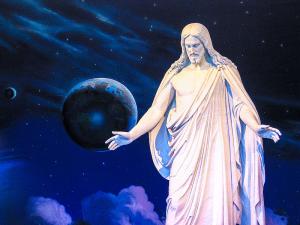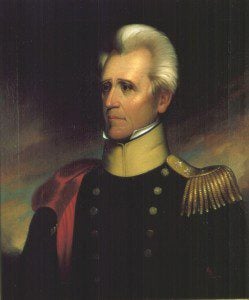One of the most common canards about Mormon teachings —embraced by attempted comics both left and right— is that faithful Mormons will, in the afterlife, “get their own planets.”
This idea derives from certain genuinely Mormon concepts of divinization: our Heavenly Parents [fn1] wish for us to become as They are: Co-creators of worlds and Parents to those worlds’ inhabitants.
But I’m not sure what people like Trey Parker and Matt Stone, writers of the The Book of Mormon musical, imagine this Mormon belief to be when they mention it. (See here.) Some see it as rank presumption and self-aggrandizement: how dare Mormons dream of becoming like God in these ways? [fn2] I also suspect that some see these planets as the Mormon analogue to jihadists’ alleged virgins: pleasure palaces where resurrected Mormons lord over billions of subjects as the Greek pantheon was said to do from Olympus.
However, neither of these explanations necessarily evokes laughter; indignation and disgust, respectively, would be more appropriate. On the contrary, the jokes about Mormons and planets seem to rely on a lack of explanation: merely mention the words “Mormon” and “planet” together for your punchline. What lends to such lazy comedy its weird power?
My hypothesis is this: to the average modern person, there is no relationship between religion and planets. The former is the realm of spirits, moralities, and dogmas; the latter of science or science fiction. What could astronomy and faith possibly have to say about each other? To imply a connection seems akin to asserting that bear mating patterns could illuminate debates about monetary policy: it’s nonsensical. Hence, funny.
But it wasn’t always this way. Famously, Dante’s Paradiso involved ascent from earth to God through the spheres of each planet. [fn3] While his genius was exceptional, his blend of theology and cosmology was not. It was only after the broad acceptance of heliocentrism and the professionalization of astronomy — limited to specialists, not one of the seven liberal arts — that planets and faith appeared to part ways.

Mormon theology resists this impulse. Beyond the creationist’s awe at the universe’s orderliness and the aesthete’s praise of the night sky or the Hubble Deep Field, Mormonism imbues the post-Copernican universe with the sanctity of the geocentric one. This Earth and many others are the realms in which sacred mortal lives are spent. Worlds in themselves are so inherently valuable that they will be preserved and perfected in the hereafter, like human [fn4] bodies. Therefore nebulae, stars, and planets fill the murals behind the Christus statue in many temple visitors centers; ordinance rooms depict the Creation with similar imagery.
As an unabashed nerd in love with the cosmos from my infancy, these elements always made my heart soar. I cherish Moses 1:33 and 35:
And worlds without number have I created; and I also created them for mine own purpose; and by the Son I created them, which is mine Only Begotten. …
But only an account of this earth, and the inhabitants thereof, give I unto you. For behold, there are many worlds that have passed away by the word of my power. And there are many that now stand, and innumerable are they unto man; but all things are numbered unto me, for they are mine and I know them.
Given my love for these elements, I feel a sense of loss when they are downplayed or replaced. I remember visiting the Oakland Temple Visitors Center as a little child. One room there had a spacescape mural that wrapped around it; the voice of Jesus would narrate to listeners the creation of the world in a way the endowment would later echo. Even though such visitors centers have improved in many ways since then — the temple cutaways are especially brilliant — they have replaced the wonders of the eternal cosmos with mockups of suburban home facades. The sealed earthly family eclipses what such families are to inherit: the heavens.
Our theological approach to the universe is a gift from God and, like many gifts from God, others do not perceive its worth. Let’s not deny this perspective on planets and sun, but employ it to become ever more like our Heavenly Parents.
[fn1] Of course, in the LDS context this includes both a Heavenly Father and a Heavenly Mother and should be accompanied by the pronoun “They.”
[fn2] Of course, under the semi-Platonic traditional Christian concept of God this is nonsensical; but Mormonism doesn’t hold semi-Platonic ideas of God as the ground of all being or the ultimate source of all perfections.
[fn3] Including the Sun and Moon, and excluding the ones discovered only with the help of telescopes (Uranus, Neptune, and depending on when you entered first grade, Pluto).
[fn4] And animal!












